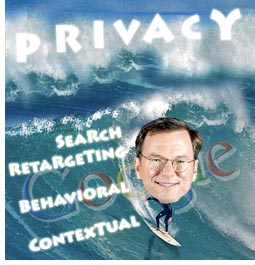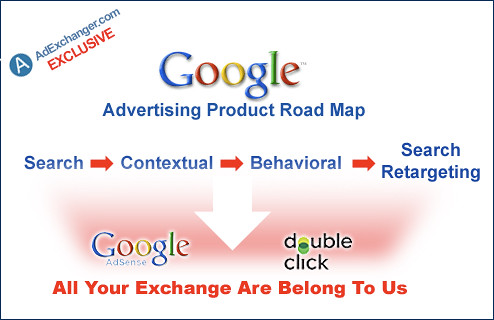It’s the second Google “killer app” after search advertising.
It’s Google’s advertising exchanges! – the exclusive location for Google Search retargeting as long as Big G can survive the privacy tidal wave.
The Evolution of the Killer App
A long time ago, in an ad world far, far away…
For many years, Google advertisers and publishers have benefited from Google’s contextual targeting technology which has been broken out in two ways via Google’s AdWords advertising app: Search and Content.
For the advertiser using Search, they get to target keywords and phrases relevant to their audience and bid for placement of their very own text display ad next to the organic results on the SERP (search engine results page).
Search is closer to the end of the purchase funnel and often is the last place a user goes before an “action” (e.g. a purchase) and has shown phenomenal results in comparison to display ads on general interest websites. Publishers have been able to share in Google’s blackbox revenue share from Search by enabling the AdSense network’s custom Google Search for their websites.
Important: there is a finite amount of display ad inventory in search.
For content websites, Google created the AdSense network of publishers who run Google code on their pages and enable contextual targeting of pages according to content category. The benefit to both advertisers and publishers is that with more relevant content and audiences for each ad, presumably the more an advertiser will compete with other advertisers and thus spend. Consequently, the publishers yield (eCPM) goes up in comparison to untargeted run-of-network inventory, for example.
Important: there is an infinite amount of display ad inventory in content.
In 2007, Google bought DoubleClick, which was in the middle of building the DoubleClick Advertising Exchange. Now complete, the DoubleClick Exchange serves larger brand advertisers and publishers.
Last month at the annual IAB conference, David Rosenblatt announced the Google AdSense exchange. Few details were made available, but it would seem likely that the AdSense exchange will serve the million advertisers targeting Long Tail audiences through AdSense’s millions of publishers, and the DoubleClick Ad Exchange will serve big brands and publishers for the time being. (Expect publishers on the AdSense exchange to be able to set eCPM pricing amidst other control options.)
Tasting The Cookie
On March 11, Google announced its entrance into behavioral targeting. Users across Google’s AdSense network will be cookied allowing Google to create user profiles as they visit pages of content across the Web. This data collection will allow advertisers to bid according to user behaviors or what Google benignly calls “interests.”
This is an important and deliberate step on the Google advertising roadmap. As Steve Smith of OMMA notes in a recent MediaPost article, it is no wonder Google took such over-the-top care with the introduction of their “privacy tool.” Big G pointed to this step a long time ago in Mountain View.
Google is tackling one of its two main Achilles heels – privacy concerns as advertising gets mapped to anonymous but individual users rather than the non-cookied, contextual advertising formula. (Google’s other main Achilles heel is that it can’t move fast anymore.)
If privacy can be solved, then the next step is worth billions – search retargeting through the display advertising exchange.
No longer will inventory growth be limited for Google as it is with search engine advertising. After all, there’s only so many times each month that keyword phrases get entered into the Google search box. And, for certain keywords in search, there’s only so high that a keyword can go before the advertiser is unable to meet its ROI goals.
With search retargeting, inventory will expand into the infinite world of display where advertisers will be able to target users who input specific keywords into search or specific, user profiles created in search.
And the perfect location for selling this new world of search retargeted display is???? YES – the advertising exchanges of DoubleClick and Google AdSense – to be likely merged at some point.
Display ads will instantly become more valuable as the purchase funnel of search gets leveraged in everyone’s ad inventory – from the premium, large site publisher to the niche blogs. CPMs will be 10x what they are today! OK, we’re joking… it’s hard to say, but there will be better reasons to buy display due to data mining in Google Search.
The Push-Pull of Ad Exchanges: Transparency and Privacy
As we have said before, insight provided by technology will increase value of media. Search retargeting is no different as search data shows “intent” by the user. If you can serve the “intent” in content throughout the web, no doubt this will help advertiser ROI and publisher yield. Yahoo! has wisely already taken the plunge as they are not seen as a threat due to its much smaller search engine share – Yahoo! is under the privacy radar for now.
Ad data exchange players like Exelate, BlueKai and Lookery are in the same boat, too – all are Google acquisition targets with its ecommerce user data and more – and will benefit from Google’s privacy battle. If Big G can solve privacy in a timely fashion, it may end up winning the war with their advertising exchanges dominating online display advertising. No doubt, Google’s data leverage mirrors the ongoing transformation of online business, and online life (such as social media), to openness, but controlled by the end user.
As a first step to an open exchange strategy, Google can remove the blackbox margins from current ad platforms such as AdWords and AdSense and become more transactional. If they can become the big exchange player, the move makes sense.
Ironically, with openness and transparency, which sounds egalitarian and democratic, comes a lack of privacy. But this is THE trend online – like it or not. Ultimately, the user is and will be given the final say through controls – like an ad exchange which gives controls to advertisers and publishers.
Giving users controls on privacy is or will be part of enabling the ad exchange model in the long run.
The Google goal: “All Your Exchange Are Belong To Us.”













